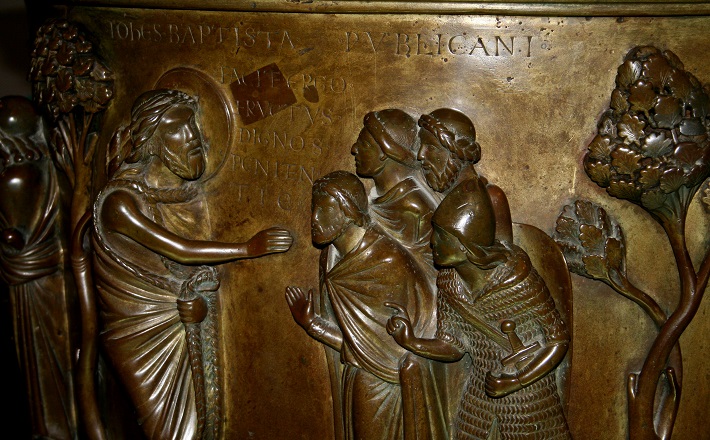Commentary on Philippians 1:3-11
The opening comments and introduction in Paul’s letters often give us an insight into something of the key aspects of what will follow in the letter as a whole, but also an insight into the life of the church to whom the letter is written and their relationship with Paul.
In this case the opening verses of this letter highlight three key themes. First, that of sharing in the gospel, second the meaning of the gospel, and third, the “good work” that God does in the life of the disciple.
Sharing in the Gospel
Paul says that every time he prays for the Philippians he does so with joy; and he is joyful because they have shared in the gospel “from the first day until now” (Philippians 1:4). We are not given any clue as to what is meant by “the first day” but most likely Paul is making reference to the earliest days of his mission to Philippi (Acts 16:12-40). An eventful mission trip if ever there was one with a wide variety of people becoming disciples of the Lord Jesus. The focus of Paul’s joy is that the Philippians have shared, and are sharing, in the gospel. Moreover Paul then reiterates the notion of sharing in verse 7, this time they are participating in God’s grace. We should not treat this sharing and the resulting joy too lightly. Paul appears to be writing this letter from his prison cell — in Philippians 1:7 he speaks of his imprisonment — and there can be no more isolated and lonely place than the prison cell. Neither should we imagine that Paul is somehow superhuman and oblivious to the suffering he was undergoing, as if it all runs on him like water off a duck’s back. For Paul to know that the Philippian disciples were continuing to share in the truth and reality of the gospel would be to him as a light in the darkness and consolation in his suffering.
Love no matter what
But what does it mean to share in the gospel? This is not about turning up to church each week and being generous when the offering plate comes around. When we read Paul’s letters we should not dislocate them from the life and ministry of Jesus. To share in the gospel is to grasp the fullness of what it means to embrace and live in the good news of the life, death, and resurrection of the Lord Jesus. A brief summary of the life, death, and resurrection of Jesus might best be encapsulated in the command to love God with hearts, mind, soul, and strength and to love one’s neighbor as oneself. And, indeed, this is precisely what we see in Jesus. Of course, we do well to remember that this love is not a romanticised or trivial love, but takes up the demands of ethics (Romans 12:9-21), loving one’s enemy (Matthew 5:44), and forgiveness (Matthew 6:14-15). Additionally, we would do well to remember the challenge given by Jesus as to what this means in day-to-day life. Jesus said, “If anyone would come after me, he must deny himself and take up his cross daily and follow me” (Luke 9:23). To share in the gospel is to love God and neighbor no matter what. Paul’s experience reminds us that even if you are persecuted and end up in prison because you refuse to stop loving, and refuse to give up the values and ethos adopted from Jesus, then you must carry on loving. The Philippians have defended and confirmed the gospel (Philippians 1:7)b and it may well be that they are suffering for their devotion to the Lord Jesus. Paul’s prayer (Philippians 1:9) begins with and affirms that they are already loving. Paul simply prays that their love might overflow more and more, because to love more is to share in the gospel more, even if that means they will suffer more.
God’s good work in us
What then of the “good work” that God is doing in the lives of the Philippian disciples and will continue do until “the day of Jesus Christ” (Philippians 1:6)? Verse six is a well known and often quoted statement reflecting our confidence and hopefulness that God works wonderfully and powerfully within us. But, it is perhaps all too easy to think that all we have to do is sit back and relax whilst God does all the hard work — after all, surely we can claim this statement as the promise of scripture, God will certainly do this. But, I’m not convinced that it is all that straightforward. Paul is addressing a community who are deeply committed to the cause of the gospel, and actively share in defending and confirming the gospel. Paul expresses his confidence because he is sure that the Philippians will continue along this road. And as they do so, so also God will work powerfully in their lives to change and transform them, causing love to overflow from them.
Love and justice as the goal
The course and flow of God’s good work in us is seen in Paul’s prayer (Philippians 1:9-11). God’s good work begins with love (verse 9). But, Paul’s hope is that this deep and passionate commitment to love might overflow with “knowledge and insight” (verse 9). This is an appeal that their love might be right-sighted; that they might be wise and judicious in their actions, so that when the day of Christ comes they might prove to be “pure and blameless” (verse 10). Perhaps the best way to understand this is to speak of an intense and blemish-free reflection of the life and love of Christ. A final note here is that Paul anticipates that it is through their devotion to Jesus Christ and their life in Him, that the Philippians will have produced a harvest of righteousness (Philippians 1:11) — that is, plainly understood, they will have embraced the challenge of living and establishing justice.


December 6, 2015